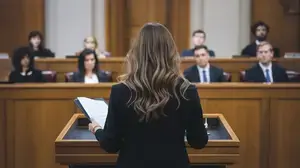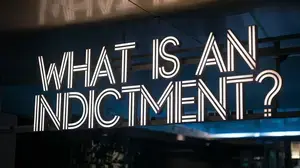What Does Indictment Mean?
 An indictment in North Carolina is a fundamental aspect of Due Process and essentially authorizes the formal prosecution of criminal charges in Superior Court. If a Grand Jury determines there is probable cause, it issues a True Bill of Indictment.
An indictment in North Carolina is a fundamental aspect of Due Process and essentially authorizes the formal prosecution of criminal charges in Superior Court. If a Grand Jury determines there is probable cause, it issues a True Bill of Indictment.
Historically, indictments involved a serious or "infamous" crime. Today, the presentment and indictment process is utilized for a wide range of different types of charges, including both felony and misdemeanor accusations.
A “True Bill” establishes, as a matter of law, there is sufficient evidence to proceed forward with criminal prosecution.
That does not mean the accused, the defendant in a criminal case, is guilty.
What Does the Word Indictment Mean?The word indict is based on the Latin word indicere, which means to proclaim, pronounce, or utter.
It serves as a type of initial review and protection against the government abusing its substantial power to prosecute criminal charges.
Understanding the difference between a charge and an indictment is important.
A charge is a formal accusation made by law enforcement, indicating that an individual is suspected of committing a crime. But, without an indictment, the accusations cannot proceed forward in Superior Court in North Carolina.
If there are “three counts” of a certain charge that result in indictments, ordinarily that would mean the Grand Jury approves the prosecution of three separate criminal offenses.
An indictment does not mean the defendant is guilty beyond a reasonable doubt.
The Role of the Grand Jury: True Bill of IndictmentThe grand jury plays a pivotal role in the indictment process.
It is convened to review materials presented by the prosecutor and is intended as a check and balance in the criminal justice system.
Indeed, in some instances it may issue a Presentment and conduct it's own investigation, requiring the prosecutor to call additional witnesses and provide information regarding a possible a crime.
That may include allegations against the government and those charged with the responsibility of law enforcement.
That is accomplished through a True Bill of Indictment in North Carolina and can involve both misdemeanor and felony cases.
This investigation process is conducted in secret to protect the integrity and independence of the deliberations.
After an indictment, a series of steps may take place in court, including possibly Bond Hearings, Arraignment, Pretrial Motions, and Jury Trial.
The function of the Grand Jury in our NC criminal justice system is very different from that of a trial jury.
Grand jurors do not decide guilt or innocence.
Instead, grand juries are involved in the beginning stages of criminal prosecution and decide if there is enough evidence to move forward with criminal charges and bring a case to trial.
Generally speaking, the defendant is not involved in the process. Indeed, the grand jury meets in private and its deliberations are secret.
This secret review of the government's work is part of the pre-trial process and a fundamental aspect of due process in the United States.
It's a condition met by the federal government (the Attorney General) for United States Code violations as well as State Court prosecutions in North Carolina.
Does Indicted Mean You're Guilty? Being indicted only means that a “true bill of indictment" was issued by the Grand Jurors. It does not mean the defendant, the person accused of breaking the law, has been found guilty.
Being indicted only means that a “true bill of indictment" was issued by the Grand Jurors. It does not mean the defendant, the person accused of breaking the law, has been found guilty.
In fact, under our system of justice and the Constitution, the defendant is entitled to a separate jury trial of his or her peers where they may confront and cross examine the witnesses against them. The constitution protects both US Citizens and foreign nationals.
As such, Grand Jury Indictments are not a Trial by Jury.
That’s true for both a federal grand jury and a grand jury convened in the jurisdiction where the criminal activity allegedly took place.
The Defendant ordinarily does not testify. The accused’s side of the story ordinarily is not heard at this stage of the process.
As such, the typical indictment means that the person who is being investigated has a very limited opportunity to be heard or even have his criminal attorney present.
The Indictment ProcessThe NC criminal laws limit who may be present during grand jury proceedings.
Consistent with NC Criminal Law 15A-626, there is no right to appear or testify without the consent of the government (the District Attorney) or judge.
An indictment, from the common law system of justice, serves as a formal accusation that a person has committed a crime.
Most states maintain the concept of felonies, the most serious criminal offense.
An indictment allows a prosecutor to proceed forward. Most states maintain the concept of felonies, the most serious criminal offense is a felony.
A true bill does not require a unanimous vote, unlike the decisions made during a jury trial for criminal charges in North Carolina.
What is a Waiver of Probable Cause?In North Carolina, there are normally three ways of proceeding forward with a criminal trial in Superior Court:
- Probable Cause Hearing – During a less formal procedural hearing, where the Rules of Evidence may not apply, a District Court Judge determines, after listening to evidence in open court, whether Probable Cause exists to move forward with felony charges. , the Judge transfers the matter to the Superior Court in the county where the alleged crime occurred.
- Waiver of Probable Cause (PC) – The Defendant may voluntarily waive (give up) the right to a have a PC Hearing. By "waiving PC," the accused, who ordinarily is a defendant who is not in custody (not in jail), may avoid being re-arrested and having to go through the process of posting bond if later indicted. That is not an admission of guilt and is generally a tactical decision made by the accused, with the guidance of their criminal defense lawyer.
- Indictment – A True Bill or True Bill of Indictment allows the charges for different alleged crimes to proceed directly to Superior Court for a trial. Like a "PC Hearing" before a District Court Judge, the grand juries hear evidence during their secret deliberations. If the Grand Jury believes there is enough evidence, it issues a “True Bill of Indictment.” If there are questions, the matter may be referred back to prosecutors for additional inquiry. The Grand Jury may also issue a “Not True Bill,” indicating it does not believe there are reasonable grounds to proceed forward. That does not preclude prosecutors from convening another Grand Jury to consider the evidence again. Because there is no finding of guilt at this stage of the process, the Double Jeopardy Rule does not apply.
"Indictments are serious. Your case deserves a criminal defense lawyer who has substantial practical courtroom experience."
- Bill Powers, Criminal Defense Lawyer
When you are being investigated by the government (the police), we think it’s smart to immediately retain an experienced criminal defense attorney. Take the 5th and Lawyer Up! Talking to the police without an attorney is not a good idea.
Criminal defense lawyers explain your legal rights, advise what options exist for you, and advocate for your best interests.
At Powers Law Firm PA, our criminal lawyers are experienced in handling criminal investigations, responding to law enforcement questions and inquiries, indictments, and the indictment process in North Carolina.
Helpful Information About Criminal Charges in North Carolina- NC Misdemeanor Death by Vehicle Law
- Are Checkpoints Legal in North Carolina?
- What happens at Bond Hearings?
- Accused of Drug Charges?
- What You Need to Know About Domestic Violence Charges in NC
- What Does Assault Inflicting Serious Injury Mean?
- Why You Should Hire a Lawyer for Robbery Charges in North Carolina
- Felony Larceny in North Carolina: Guide to Defense Strategies
- NC Criminal Law FAQs
- Charlotte Criminal Lawyers: Assault & Battery Charges
- What You Need to Know About Alcohol and Possession Charges in NC
- What is CCW? Carrying Concealed Weapon Laws
- What is Communicating Threats?
- DUI FAQs in North Carolina
- Need to Drive After a DUI Arrest in NC?
- Are There Differences Between DWI and DUI?
- Arrested for DWI in North Carolina? What Happens Now?
- What Does Indictment Mean?
- How Much Does a DUI Cost Over 10 Years?
- How to Beat a DUI-DWI: Top 9 Ways for Beating a NC DWI
- Is DUI a Felony in North Carolina?
- DWI Charges in North Carolina – Field Sobriety Tests and Standardized Field Sobriety Testing
- Are DWI Breath Tests Ever Wrong?
- Is the Roadside “Breathalyzer” Reliable?
- What is a Pre Trial Limited Driving Privilege?
- What is an Ignition Interlock Device or “Blow and Go?”
- What is Probable Cause in DWI charges?
- What are Miranda Rights and DUI?
- What Does Indictment Mean in North Carolina?
- New York City Mayor indictment information for aiding Turkish government -Click Here
 An indictment is a formal accusation of a crime or crimes, determined by a grand jury, which is a group of citizens who hear evidence and decide whether to indict a person for a crime. The indictment is a written statement that outlines the charges against the defendant and is usually overseen by the government through the prosecuting attorney (the ADA).
An indictment is a formal accusation of a crime or crimes, determined by a grand jury, which is a group of citizens who hear evidence and decide whether to indict a person for a crime. The indictment is a written statement that outlines the charges against the defendant and is usually overseen by the government through the prosecuting attorney (the ADA).
The indictment process typically begins with an investigation by law enforcement and prosecutors deciding whether to proceed with criminal charges. If there is probable cause to believe that a crime has been committed, the Grand Jury will issue an indictment. An indictment is necessary to formally charge and prosecute a defendant in Superior Court in North Carolina.
Formally charging a defendant can have serious consequences. If convicted (found guilty at trial or after a guilty plea) they may face the possibility of prison, fines, or other penalties. An indictment can also damage the defendant’s reputation in the community.
Helpful Information About Criminal Charges
 Powers Law Firm PA Home
Powers Law Firm PA Home














